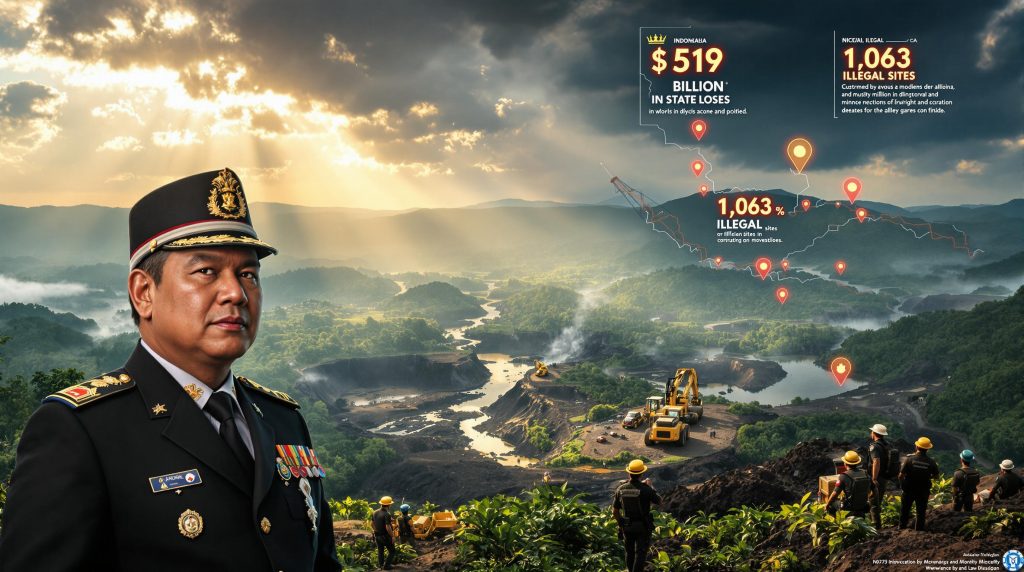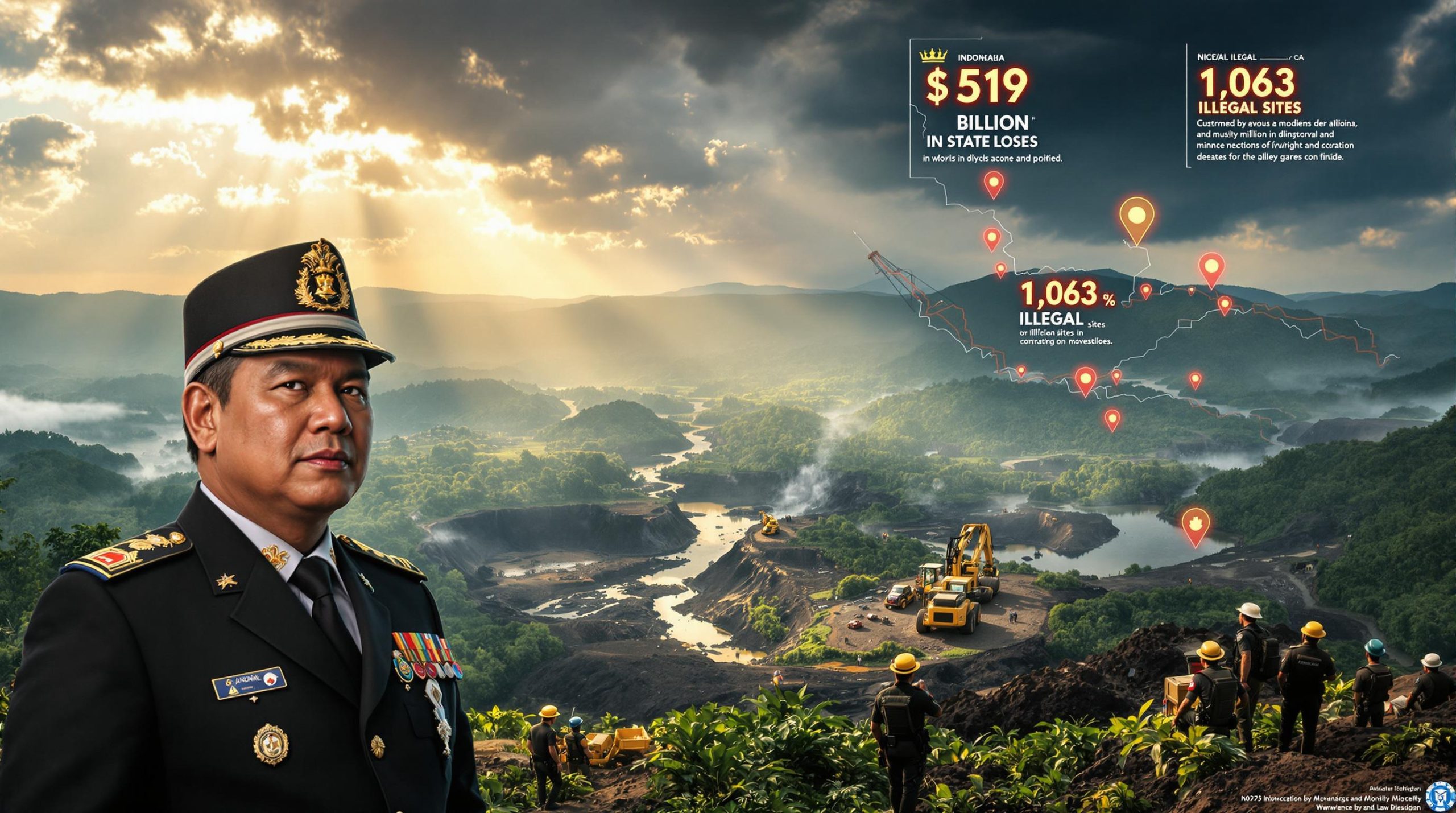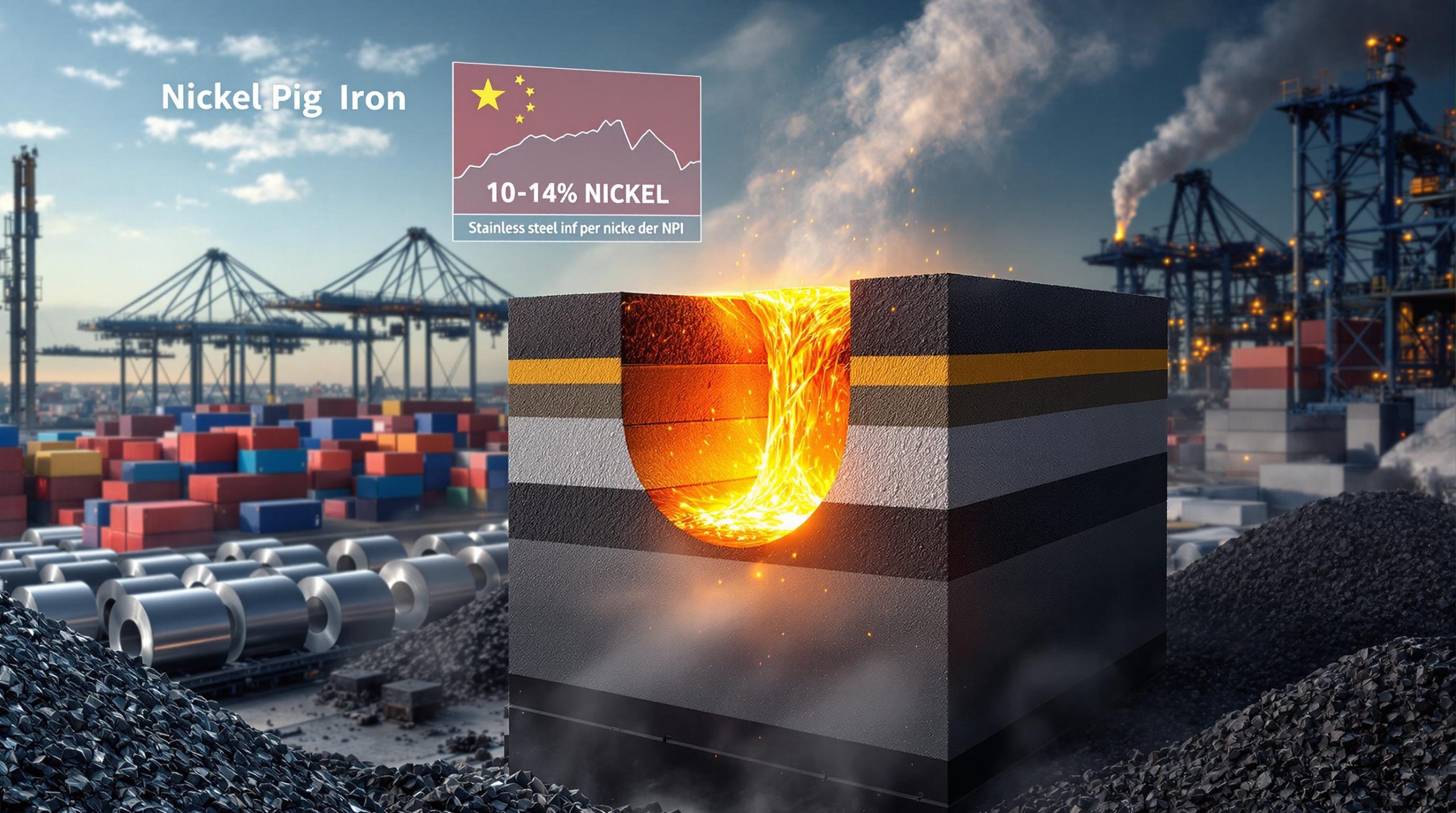Indonesia's Mining Crackdown: President Prabowo's Bold Initiative Against Illegal Operations
Indonesia stands at a critical juncture as President Prabowo Subianto launches an unprecedented crackdown on illegal mining operations across the resource-rich archipelago. With over 1,000 illegal mining sites identified nationwide, this enforcement initiative represents one of the most significant natural resource governance reforms in recent Indonesian history.
The Scale of Indonesia's Illegal Mining Problem
Indonesia's vast natural resources have long been exploited through unauthorized channels, creating a shadow economy that operates outside government oversight. Recent government assessments have identified 1,063 illegal mining sites scattered across the nation's resource-rich regions, from Sumatra to Papua.
The financial impact is staggering. Government estimates suggest illegal mining operations cost Indonesia approximately 300 trillion rupiah ($19 billion) in state losses annually through tax evasion, royalty avoidance, and unregulated resource extraction. This hemorrhage of potential revenue significantly impacts Indonesia's development budget and public services funding.
Beyond financial concerns, these operations leave behind a trail of environmental devastation. Unauthorized mining frequently occurs in ecologically sensitive areas, causing widespread deforestation, water contamination, and habitat destruction that will take generations to remediate through mine reclamation innovations.
Key Commodities Targeted by Illegal Operations
Nickel, a critical component in electric vehicle batteries and stainless steel production, stands as perhaps the most severely affected commodity. Indonesia possesses the world's largest nickel reserves, making it a prime target for illegal extraction operations.
Coal mining faces similar challenges, with unauthorized operations throughout Kalimantan and Sumatra extracting millions of tons without proper permits or environmental safeguards. These operations frequently use substandard extraction methods that maximize short-term yields while causing long-term environmental damage.
The tin mining sector, particularly in the Bangka Belitung Islands, continues to battle rampant illegal mining that undermines legitimate operations and regulatory frameworks. Artisanal miners often operate in dangerous conditions while extracting resources that enter global supply chains without proper documentation or traceability.
Other affected minerals include gold, copper, and various rare earth elements essential for modern technology. The widespread nature of these illegal operations presents a complex enforcement challenge that spans multiple islands and jurisdictions.
President Prabowo's Enforcement Strategy
President Prabowo has signaled a dramatic shift in enforcement approach compared to previous administrations. During his inaugural State of the Nation address in Jakarta, he committed to "rectify" all identified illegal mining operations across Indonesia, framing the issue as both an economic and sovereignty concern.
"We cannot allow our national treasures to be stolen any longer," Prabowo declared. "Every mineral extracted without proper authorization represents wealth stolen from the Indonesian people and future generations."
The president's strategy includes several key components:
- Formation of specialized task forces combining military, police, and civil authorities
- Enhanced satellite and drone surveillance of known mining regions
- Strengthened penalties for illegal mining operations and their financial backers
- Streamlined permitting processes to encourage legitimate operations
- International cooperation to track illegally exported minerals
This multifaceted approach represents a significant escalation compared to previous administrations, which often lacked the coordination and political will to effectively address the issue at scale.
Comparison with Previous Administration's Approach
The current enforcement initiative marks a clear departure from former President Joko Widodo's more incremental approach to mining regulation. While the previous administration implemented important regulatory reforms, including the 2020 Mining Law revisions, enforcement remained inconsistent and often undermined by corruption at various governmental levels.
Prabowo's administration has expanded enforcement capacity significantly, allocating additional resources to monitoring and compliance operations. The Ministry of Energy and Mineral Resources now employs advanced satellite imaging technology to identify potential illegal operations, allowing for more targeted enforcement actions.
The legal framework has also been strengthened, with amendments to the criminal code increasing penalties for illegal mining activities. Offenders now face up to 10 years imprisonment and substantial fines based on the estimated value of illegally extracted resources.
Perhaps most significantly, the new administration has improved coordination between previously siloed government agencies. The creation of a unified national task force has eliminated many of the jurisdictional conflicts that previously hampered effective enforcement.
Broader Resource Sector Reforms
The mining crackdown represents just one component of Prabowo's wider natural resource governance reforms. The palm oil industry, Indonesia's largest agricultural export sector, has also come under increased scrutiny.
Recent enforcement actions have resulted in the seizure of approximately 3.1 million hectares of non-compliant palm oil plantations operating without proper permits or on protected lands. The government has launched high-profile cases against major producers, including legal action against plantation operators allegedly operating in protected forest areas.
The energy sector faces similar increased oversight, with corruption investigations targeting several divisions within state oil firm PT Pertamina. These investigations form part of a broader review of existing energy production contracts and licenses, many of which were negotiated under conditions that government officials now claim disadvantaged the state.
Marine resources have also received increased protection, with enhanced monitoring of Indonesia's territorial waters to prevent illegal fishing and maritime resource extraction by both domestic and foreign vessels.
Environmental Drivers of Reform
Environmental concerns feature prominently in the government's justification for these enforcement actions. Illegal mining operations typically lack environmental impact assessments or remediation plans, leading to severe ecological damage.
Deforestation presents a particularly serious concern, with illegal mining operations frequently clearing protected forest areas to access mineral deposits. This habitat destruction threatens Indonesia's extraordinary biodiversity, including endangered species like orangutans, Sumatran tigers, and numerous endemic plant species.
Water pollution from unregulated mining severely impacts downstream communities and ecosystems. Heavy metals, processing chemicals, and sediment from mining operations contaminate rivers that rural communities depend on for drinking water, fishing, and agriculture.
Soil degradation and erosion caused by improper mining techniques further compound these environmental challenges, leaving formerly productive land unsuitable for agriculture or reforestation efforts.
Planned Environmental Enforcement Actions
The Ministry of Environment has announced targeted enforcement actions against companies operating in the Indonesia Morowali Industrial Park, a major nickel processing hub in Central Sulawesi. Environmental officials have identified numerous compliance violations, particularly related to waste management and water treatment standards.
Penalties for environmental breaches now include mandatory ecosystem rehabilitation requirements in addition to financial penalties. Companies found in violation must not only pay fines but also implement approved remediation plans to restore damaged ecosystems.
The government has introduced stricter mining permitting basics and environmental standards for all mining operations, requiring comprehensive impact assessments, waste management plans, and regular environmental monitoring. These enhanced requirements apply retroactively to existing operations, forcing many companies to upgrade their environmental management systems.
A particularly innovative aspect of the environmental enforcement approach involves community monitoring programs that empower local residents to report environmental violations through a dedicated smartphone application, creating a nationwide monitoring network to supplement official enforcement efforts.
Global Supply Chain Implications
The crackdown on illegal mining operations will likely cause significant disruptions to global supply chains, particularly for minerals critical to emerging technologies. Indonesia supplies approximately 30% of the world's nickel, making any production disruptions highly consequential for industries ranging from stainless steel to electric vehicle battery manufacturing.
Market analysts anticipate potential price volatility for Indonesian commodities during the enforcement period as supply constraints impact global markets. Nickel prices on international exchanges have already shown increased volatility in anticipation of possible supply disruptions.
Coal exports may experience fluctuations as enforcement actions target unauthorized operations. While Indonesia remains Southeast Asia's largest coal producer, a significant percentage of production occurs through small-scale operations with varying degrees of regulatory compliance.
The tin market, already facing supply constraints, could experience additional tightening as illegal operations in the Bangka Belitung Islands face increased scrutiny. Indonesia ranks as the world's second-largest tin producer, making its supply stability crucial for electronics manufacturing globally.
Industry Response to Regulatory Changes
The mining industry has responded to these regulatory changes with a mixture of concern and cautious support. Major mining companies with proper permits and environmental compliance systems generally welcome the crackdown on illegal operations that create unfair competition and damage the industry's reputation.
"Legitimate operators have always faced unfair competition from illegal miners who don't pay taxes or follow environmental regulations," noted the Indonesian Mining Association in a recent statement. "A level playing field benefits companies committed to responsible mining practices."
Companies throughout the supply chain are implementing enhanced due diligence processes to ensure their materials don't originate from illegal operations. Major electronics and battery manufacturers have announced stricter traceability requirements for Indonesian minerals used in their products.
Mining operations previously operating in regulatory gray areas are seeking formalization, applying for proper permits and implementing compliance measures to avoid enforcement actions. This transition toward formalization represents a positive development for the sector's long-term sustainability, though it creates short-term operational challenges.
Economic Implications of Mining Reforms
While enforcement actions may cause short-term economic disruptions, the government anticipates significant long-term financial benefits from properly regulated mining operations. Increased tax revenue from formalized operations could potentially add billions of dollars annually to state coffers.
The reduction of resource theft and tax evasion will provide a more accurate accounting of Indonesia's natural resource wealth, allowing for better long-term planning and resource management. This improved governance may also attract increased foreign direct investment into compliant mining operations, as legitimate investors generally prefer regulatory certainty.
However, these reforms present significant challenges for local economies dependent on informal mining activities. Tens of thousands of workers are employed in unauthorized mining operations, many in remote areas with few alternative employment opportunities. The government has acknowledged this challenge but has yet to announce comprehensive transition programs for affected workers.
Communities built around informal mining activities face particularly difficult adjustment periods as enforcement actions disrupt established economic patterns. Provincial governments in mining regions have requested federal assistance to develop alternative livelihood programs and economic diversification initiatives.
Strategic Resource Management Goals
Prabowo's natural resource reforms align with Indonesia's broader strategic goal of maximizing national benefit from its abundant natural resources. The government has frequently articulated its determination to ensure that Indonesia's mineral wealth benefits its citizens rather than primarily enriching foreign companies or corrupt officials.
Ensuring sustainable extraction practices forms another pillar of this strategy, with officials emphasizing that short-term profits cannot come at the expense of long-term environmental health. This focus on sustainability represents an important shift in Indonesia's resource management philosophy.
The government continues to strengthen Indonesia's position in global commodity markets, leveraging its resource abundance to influence pricing and policy. The nickel export ban implemented in 2020 demonstrates Indonesia's willingness to use its resource position strategically, forcing downstream processing investment within the country.
Developing value-added industries represents perhaps the most ambitious component of Indonesia's resource strategy. Rather than simply exporting raw materials, the government aims to build processing capacity within Indonesia, capturing more of the value chain domestically. The growing number of nickel processing facilities and electric vehicle battery production initiatives exemplify this approach.
Regulatory Framework Improvements
Modernization of mining regulations continues alongside enhanced enforcement efforts. The Ministry of Energy and Mineral Resources has announced a comprehensive review of existing mining regulations to eliminate contradictions and close loopholes that enabled non-compliance.
Enhanced transparency in resource sector governance represents another key improvement, with increased public access to mining permit information, environmental compliance records, and tax payment data. This transparency supports both governmental and public oversight of the sector.
Legal protections for state interests in resource extraction have been strengthened through contract renegotiations and revised royalty structures. The government has shown increased willingness to challenge contracts perceived as disadvantageous to national interests.
Indonesia's regulatory framework increasingly aligns with international standards and best practices, though with adaptations to reflect the country's specific circumstances and development priorities. This alignment helps attract responsible international investors while maintaining Indonesia's resource sovereignty.
FAQs About Indonesia's Mining Crackdown
What legal authority does President Prabowo have to enforce mining regulations?
Indonesia's 2009 Mining Law (Law No. 4/2009) and its 2020 amendments (Law No. 3/2020) provide comprehensive legal authority for mining regulation. These laws establish the government's authority to issue and revoke mining permits, enforce environmental regulations, and prosecute unauthorized mining activities. The President, through the Ministry of Energy and Mineral Resources, holds broad regulatory authority over the mining sector.
How will the crackdown affect Indonesia's nickel production?
Short-term disruptions seem likely as enforcement actions target non-compliant operations. However, the government expects longer-term production stability as the sector transitions toward properly regulated operations. The emphasis on downstream processing means that while raw nickel exports may decrease, processed nickel product exports should continue increasing.
What happens to workers employed in illegal mining operations?
The government has indicated plans to develop transition programs for workers displaced by enforcement actions, though specific initiatives remain under development. Previous resource sector reforms have included skills training programs and alternative employment initiatives, particularly in renewable energy, eco-tourism, and sustainable agriculture. The effectiveness of these transition programs will significantly influence local community support for continued enforcement actions.
How will international investors respond to these enforcement actions?
Legitimate mining investors generally welcome improved governance and regulatory enforcement benchmark, as these conditions create a more predictable operating environment. However, the transition period will likely include adjustment challenges as companies adapt to enhanced compliance requirements. Investment analysts note that well-established mining companies with strong environmental and governance practices may gain competitive advantages in this more regulated environment.
What environmental standards will be enforced in the mining sector?
Indonesia's environmental standards for mining operations have progressively strengthened in recent years. Current requirements include comprehensive environmental impact assessments, detailed waste management plans, water quality protection measures, and post-mining land reclamation obligations. These national standards increasingly align with international best practices, though implementation and enforcement have historically varied by region and operation scale.
Indonesia's Resource Future: Balancing Development and Sustainability
The crackdown on illegal mining operations represents a critical step in Indonesia's journey toward more sustainable and beneficial resource management. While enforcement actions may cause short-term disruptions, they address fundamental governance challenges that have undermined Indonesia's development potential for decades.
Success will ultimately depend on balancing legitimate enforcement with economic transition support for affected communities. The government must demonstrate that improved resource governance delivers tangible benefits to Indonesian citizens, particularly those in resource-rich regions who have often seen few advantages from their natural wealth.
As President Prabowo continues pushing for mining permit reforms, international markets, environmental advocates, and local communities will closely monitor both the enforcement actions and their impacts. The stakes are high—not just for Indonesia's economic future, but for global supply chains dependent on its abundant natural resources and for companies that have halted mining operations due to similar regulatory challenges in other jurisdictions.
According to recent reports from Reuters, Prabowo Subianto has vowed to intensify efforts against illegal resource exploitation, describing it as "stealing from future generations." The Jakarta Post further reports that the president has warned military and police figures protecting illegal operations that they will face severe consequences under the new enforcement regime.
Looking to Invest in the Next Major Mineral Discovery?
Discover significant ASX mineral discoveries as they happen with Discovery Alert's proprietary Discovery IQ model, which instantly transforms complex mineral data into actionable investment opportunities. Explore why historic discoveries generate substantial returns by visiting Discovery Alert's dedicated discoveries page and begin your 30-day free trial today to position yourself ahead of the market.




